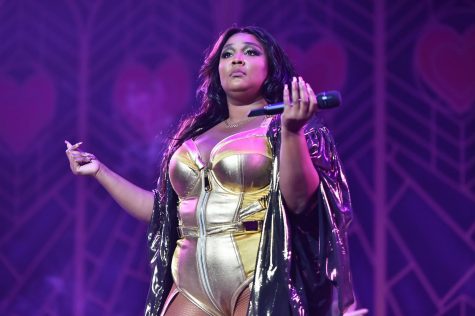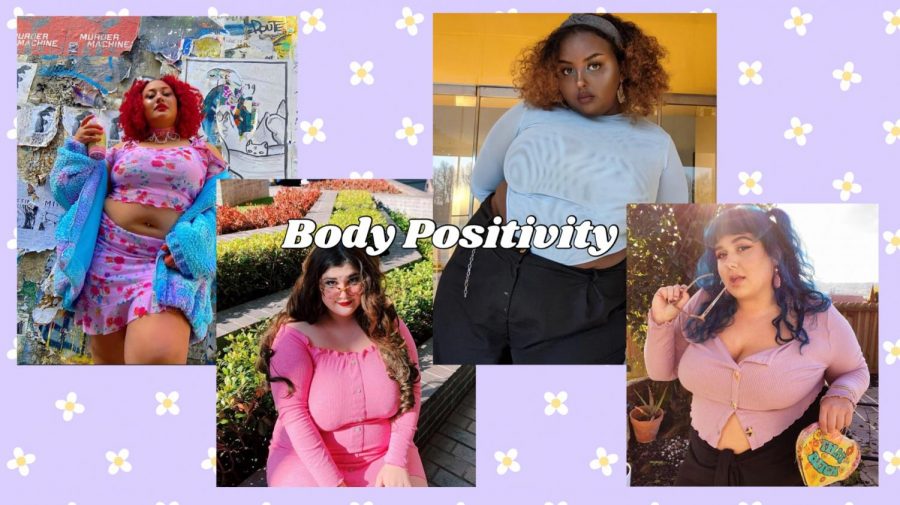Body Positivity 101: History, Journey, Acceptance
Pictured from left to right with their twitter accounts: Harmonie Deflippis (@MotherMulatto), Cinnamon (IG: @CinnamonnBaby), Gorda (@FierceFatFemme), and Jamila (@TheSirachaBro). These women are in the modeling industry.
A 12-year-old girl who’s supposedly 50-lbs overweight stands in line at the Walmart checkout counter with her mom. She sees countless fat-shaming magazines headlines about Kim Kardashian.
“Kim Kardashian can’t lose baby weight.”
“Kim Kardashian has 65-lbs weight gain.”
“Kim Kardashian gets paid to be fat.”
The 12-year-old girl was looking at a woman who had more curves, more jawline, and less arm fat than herself, and Kardshian was labeled as severely obese?
Well, that 12-year-old girl was me.

I have vivid memories of the countless magazines attacking Kim Kardashian for her ever-changing body. I could never understand what was wrong with her though.
Often post-pregnant women are perceived as unattractive. When Kardashian lost her exaggerated hourglass silhouette, the media highlighted every gained inch. If people weren’t held up to a high standard to be thin, maybe everyone would see Kim Kardashian as a beautiful and normal new mother, who just gave birth to a child.
That’s why this beauty standard of having a hourglass shaped, no stretch-marked, no cellulite, tight skinned body needs to go. It’s far from the norm, and there are more people without those qualities than people who have them. It’s normal to not have those features, so why is it so hard to accept people of different shapes and sizes?
Many movements have tried to bring awareness about the need for body size acceptance, and almost all of them have been criticized. “It’s not fine to be fat. Celebrating obesity is irresponsible,” said Lizzie Cernik from The Guardian. According to many, being fat is repulsive, unhealthy, and, most of all, ugly.
However, I believe the Body Positivity movement is different from past movements. The message is simple. People who don’t match the beauty standard aren’t ugly.
What is Body Positivity?
The definition can be explained as bringing positivity to marginalized bodies, or anyone who feels outcast by the perfect image of beauty we have today.
TikTok is a very popular app focused on trends. Many trends involve a specific dance that correlates with a popular song at the moment. Skinny girls do it and get praised for it. A fat girl does it and every single comment is about her appearance. Not about if she did the dance well or not.
Another girl who is on the thinner side could do this exact same dance but receive different criticism.
All the skinny girls get comments like:”She’s stunning!” “She’s so pretty, I think I have a crush on her.” “Please stop, you’re too cute.”
On the other hand, fat girls get comments such as:
“Sorry, but no.” “God is testing me today.” “POV: you ran to the comments too.” (This comment is referring to automatically assuming the creator is getting hate comments.)
The little compliments fat girls do get, are backhanded. “I love your confidence!”
“Some people look at Plus Size Princesses and just can’t understand how we get out of bed in the morning, let alone put on a cute outfit. Because in their minds, if they were a big girl, they’d just die. If they were a big girl they’d either be at the gym working out, or they’d be in bed under the covers hiding. If they were a big girl, no amount of Spanx would make them comfortable enough to wear anything other than baggy sweats… So when they look at us, living full unapologetic lives, consciously or subconsciously they can’t help but comment on it, often in the form of a confidence compliment,” writes Cece Olisa, a plus size fashion blogger,
Fat people are never taken seriously, especially in the media. People only see them as the butt of a joke. Fat Amy (Rebel Wilson) from the movie Pitch Perfect is an example. I mean, her character name is Fat Amy.
Her entire character is centered around being fat. There’s almost no complexity to her personality other than to be for comedic purposes. Her biggest secret is that her real name is “Fat Butchershop” for crying out loud.
That’s what they say: if you’re fat you either have to be a man or insanely funny.
Women face discrimination about their weight all the time. Is it equal to men? Not entirely.
Having rock hard abs, toned muscles, and being at the very LEAST 6’0 has always been the standard for men.
Mackenzie Pearson from The Odyssey wrote, “While we all love a sculpted guy, there is just something about the dad bod that makes boys seem more human, natural, and attractive.”
If having fat on your body makes men seem more human, then why doesn’t it go for everyone? Body Positivity stretches across many groups of people but only few are being accepted.
History of Body Positivity
Many supporters of this movement have no idea who started it. Cosmopolitan may say Tess Holliday created the movement, and she herself thinks she was the breakthrough the world needed.
Despite that, the Body Positivity movement actually goes back all the way to the 1960s. Fat, black, queer women are the core members of this movement.
Briana Dominici, a reporter at Zenerations says, “Paul Edwards, a professor at Fisk University, went on to perform a study in 1932 on black consumerism. He presented urban African Americans with ads depicting Black women as mammies…The caricature portrayed a happy, grinning, fat Black woman with a scarf around her head, portraying content and loyal servitude.”
Like the familiar “Aunt Jemima” brand, this character is rooted in the term “mammy” meaning black women who serve as nannies/maids to white children.
However, the women were more upset about the way fat women were being portrayed in the ads. Johnnie Tillmon was a famous face in this movement, and her comment about being fat increasing her already harsh discrimination made headlines.
The Body Positivity movement has been significantly whitewashed.
“Arguably, much like the feminist movement, body positivity has become non-intersectional and prioritizes/celebrates the thoughts, feelings, opinions and achievements of white women, with a small number of ‘token’ people of color to help fill up the ‘look at us being diverse!’ quota,” says Stephanie Yeboah in The Curvey Fashionista.
This movement has the potential to change the minds of many, but we must not forget the people who paved the way for us.
Other Fat Acceptance Movements
Fat Acceptance is the root of Body Positivity, but it has changed drastically than what it used to be in the 1960s.
“Originally called the ‘National Association to Aid Fat Americans’ when it was founded in 1969, NAAFA was groundbreaking in addressing weight bias and discrimination against fat people as a civil rights issue. In their early days, they focused on letter-writing campaigns and providing a social network for its members, which included fat people as well as those who were attracted to fat people. NAAFA began holding an annual conference, which allowed fat people to meet, dance, celebrate, find community, and even find romance,” writes Lindo Gerhardt at the Center for Discovery.
The name has now changed to the “National Association to Advance Fat Acceptance” and is driven to more political issues related to fat people. Examples of this are healthcare bias and attempting to create some sort of protection for fat people against discrimination.
Even in the NAAFA, different political groups have formed. On the more radical side, The Fat Underground was a group created by mostly radical feminists and lesbians in the 1970s. The group eventually split from its mother organization. For a good reason, too.
The Fat Underground also stemmed its roots from the Radical Therapy Movement (mental health profession reform). They believed that society should change, not them.

“Doctors are the enemy. Weight loss is genocide,” was the Fat Underground motto, researcher Micaela Foreman writes.
This is where these radical fat acceptance movements start to become toxic. Being fat is not healthy and never has been. Ignoring that will only cause more health problems and possibly expand the obesity epidemic. Yes, fat people should be treated equally like all humans, but disregarding the health problems that come with being overweight to be treated equally is harmful.
Another toxic fat acceptance movement is “Health At Every Size.” They came after the Fat Underground and were inspired by them. Led by Dr. Lind0 Bacon, the HAES movement has ideals that would surprisingly be considered great for the Body Positivity movement.
“Bacon argued that most people won’t succeed at weight loss, asserting that only 5 percent can sustain it. She called those who do succeed ‘statistical anomalies’ whose habits are ‘akin to eating-disordered behavior and extreme amounts of exercise’,” says the Chicago Tribune.
This ideology is insinuating that dieting and exercise regimes should be ignored as they are useless and only work for a select few. It fails to recognize that many diseases come with obesity, like type 2 diabetes, heart disease, and other dangerous health problems that can result in death.
Despite what they’ve said before, the Dr. Lindo Bacon has since retracted their statement and now says, “On an individual level, naming and acknowledging the social roots of health inequities can help a person lighten up on the self-blame, realistically consider their life circumstances, and come up with solutions that best allow them to engage in self-care.”
The Body Positivity movement only focuses on loving the body you were born with and not feeling shame for having it. Continuing to live a healthy lifestyle is also a part of this movement, but people seem to mix up glorification with self-love.
An example of fat glorification would be the Heart Attack Grill in Las Vegas. You get praised for being over 300 lbs and even get to eat free if you are, like it’s some sort of goal or prize.

This is nowhere near the same as hyping up a fat girl wearing a crop top and saying she looks pretty. That is what self-love is. Everyone deserves to feel pretty in a crop top no matter your size.
All in all, no one is saying that being fat is amazing or the best. All that the Body Positivity movement is doing, is trying to make marginalized body types normal. “Asking for equality does not mean glorifying obesity,” writes Yvette Dione in Yes Magazine.
Is skinny-shaming the same as fat-shaming?
The amount of discrimination fat people face compared to skinny people is just not on the same level. Some skinny people like to argue that people will tell them to “eat a burger” and act like it’s on the same end as being bullied for being fat (no one should be bullied regardless). The fact that people will starve themselves to death because they are so afraid to look like me says it all.
People who are skinny are already the beauty standard. You can’t be oppressed when you meet the standard of society. No one is going to look at you differently or deny
Crystal Hernandez has been on both ends of the BMI scale. She represents many women whose weight fluctuates throughout their adult lives.
“I was a size 0 back in the day, and now I’m a 22. People definitely treat you differently,” said Hernandez.
As times change, being overweight is more common, but still not accepted.
“I was never bullied for my small size. Not many people were overweight back then, since we were all forced to be outside all the time,” said Hernandez.
It is true that over time, kids have been spending less time outside and being active. Whether that be because of technology or that it can be unsafe.
Hernandez said, “Being an overweight adult, I’ve noticed that people are more friendlier when you’re skinny. People do good deeds for you, look at you, and are overall more accepting. I very much agree that there is a privilege when it comes to being skinny, unfortunately.”
Skinny privilege is often debated being a real thing. Do people treat people better based on size?
Yes.
“I wish people didn’t act differently, but they do. They are nice, but not as nice, especially in hospitality. When I was thin, at car washes, people would clean the inside of my car better and do extra detailing. When I became overweight, I noticed they aren’t as caring. They didn’t do anything extra, out of kindness that is,” said Hernandez
Medical discrimination
That being said, skinny privilege is a real thing and fat people are being overshadowed by it every day. Skinny people can get better jobs and better health care without any questions asked.
“In 1993 Bonnie Cook sued the Ladd Center, a facility for people with disabilities in Rhode Island, for discriminating against her in the hiring process. She claimed their refusal to hire her because of her weight violated the Rehabilitation Act of 1973, a law that is usually used to prove discrimination against people with disabilities. She was awarded $100,000 in damages, and the Ladd Center was ordered to hire her,” says Dionne.
The medical world is another huge issue when it comes to fat people. Most fat-activism movements get it wrong when they say that being told to diet and exercise is a scam, but they aren’t always lying when they say doctors are our enemies.
Around four years ago my hair started falling out. I’ve seen around four doctors and all of them say it has something to do with my weight. They never once thought to run tests, and I just found out around three months ago this year that I actually have alopecia. All it took was one biopsy and a doctor that actually looked at my head.
It’s situations like these that are the reason why Body Positivity needs to be normalized. If my weight wasn’t always the main focus, perhaps I could’ve known my health problems sooner.
There are many health issues like PCOS and hypothyroidism that make it extremely hard to lose weight. Just telling someone to “go lose weight” or “go to the gym” is a naive statement in itself.
No one knows anyone’s health concerns, and frankly, it’s none of their business. Fat people aren’t begging for any advice either. If they were, they would ask. So every time there’s a response to a fat person along the lines of telling them what to do, think about what they already know.
Personal Experience
Not even fat people understand that you can’t lose 20-lbs over night.
I’ve personally struggled with hypothyroidism for most of my life, and not everyone knows that. People have assumed I’m just lazy and refuse to exercise/eat healthy. Trust me, I’ve tried. Hundreds of times. Gaining and losing 10-lbs every other week doesn’t exactly leave me with much progress. So why can’t I just love the body I have now and continue to take care of it?
Throughout my years in school, people see my body and walk away.
One time, a girl came up just to inform me that another girl thinks I’m fat. Like I didn’t know that already?
Very few see the “me” that is brilliant, funny, accepting, and loyal.
People see me alone, struggling to run in gym class, struggling to walk in tight spaces, and see my double chin. I feel like he only time they want to talk to me is when I wear a crop top and eat a salad.
It’s almost like my extra weight makes me a different species. If I was thinner, I would be part of the human race.
Why everyone can have self-love, but not Body Positivity.
One of the biggest issues that the Body Positivity Movement faces is the people who think they are included.
It all starts by the misunderstanding of the name “Body Positivity”. People think it means being positive about ALL bodies. This is similar (but no way in comparison) to the saying, “all lives matter” when it comes to the Black Lives Matter movement. Do all lives matter? Yes. Are they being treated equally? No.
“We’re still getting looked down upon. We’re still getting talked about, memed, shamed, and no one cares anymore because it’s like, ‘Body positivity is for everybody.’ Yes, please be positive about your body. Please use our movement to empower yourself. That’s the point. But the people who created this movement, big women, big brown, black women, and queer women are not benefiting from the mainstream success of it. Our bodies are none of your business. Our health is none of your business,” says pop-star, Lizzo.

Fat people are benefiting the least from this movement, and it’s because of skinny people inserting themselves into places they don’t need to be. They think that if they aren’t included, it means they can’t have insecurities. From the beginning, no one has ever said that.
That’s where self-love comes in. Everyone should love themselves and be able to look in a mirror without feeling disgusted.
The word “fat” has a negative connotation already. When all your skinny friends talk about feeling fat, and then tell you, “no, you’re not fat, you’re beautiful!” It’s implying that fat is equal to being ugly.
The Body Positivity movement is trying to get rid of that negative connotation. If we respect the way people look, we can achieve this goal. People with imperfect body types are beautiful and shouldn’t be labeled as anything less.
Your donation will support the student journalists of Linganore High School. Your contribution will allow us to purchase camera/recording equipment and software. We hope to raise enough money to re-start a monthly printed issue of our paper.













Alexis Simmerman • May 21, 2021 at 10:31 am
I’m very sorry that you’ve been having trouble with your self esteem because of your weight. You’d really think people would be more mature than to directly criticize someone’s body, but I guess society is far from mature. I understand where you’re coming from here, though I have the exact opposite problem I guess. I was underweight for the longest time, partly my fault because I was always a picky eater. Let me tell you, the opposite end of the spectrum isn’t pretty either because being too thin can stunt your growth and your physical well being. Trust me, you probably would beat me in a race easy. I’ve gotten better at maintaining a healthy weight, but I can’t imagine why people would actually want others to be underweight. I’m pretty body positive myself, mostly because looks don’t even occur to me most of the time, and I also have a personal boycott against makeup. I guess that contributes to why I’m not exactly popular, but I’ve managed to stay positive about my looks. As I always say, just love yourself for who you are. We’re all beautiful in our own ways, and no photo shopped Hollywood celebrity should ever make you feel like your star doesn’t’ shine as bright.